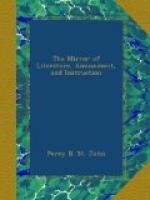When the statute 1st. Edward VI. c. 3. was made, which ordained, that all idle vagabonds should be made slaves, and fed upon bread, water or small drink, and refuse of meat; should wear a ring round their necks, arms, or legs; and should be compelled, by beating, chaining, or otherwise, to perform the work assigned them, were it ever so vile;—the spirit of the nation could not brook this condition, even in the most abandoned rogues; and therefore this statute was repealed in two years afterwards, 3rd and 4th of Edward VI. c. 16.
P.T.W.
* * * * *
FINSBURY.
(For the Mirror.)
Fitzstephen, in his Description of London, 1282, gives the following account of skating in Moor, or Finsbury Fields, which may afford amusement to the inquisitive reader:—
“When that vast lake which waters the walls of the city towards the north is hard frozen, the youths, in great numbers, go to divert themselves on the ice—some, taking a small run for an increment of velocity, place their feet at a proper distance, and are carried sideways a great way; others will make a large cake of ice, and seating one of their companions upon it, they take hold of one’s hands, and draw him along, when it happens that moving swiftly on so slippery a plane, they all fall headlong; others there are who are still more expert in these amusements on the ice—they place certain bones (the leg-bones of animals) under the soles of their feet, by tying them round their ankles, and then taking a pole, shod with iron, with their hands they push themselves forward by striking it against the ice, and are carried on with a velocity equal to the flight of a bird, or a bolt discharged from a cross-bow.”
This tract affords the earliest description of London; and Dr. Pegge, in his preface to said Description, says, “I conceive we may challenge any nation in Europe to produce an account of its capital, or any other of its great cities, at so remote a period as the 12th century.”




